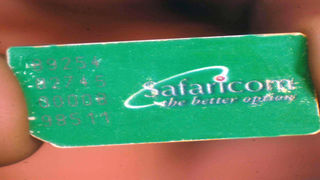
A Safaricom Sim.
| Joseph Kanyi | Nation Media GroupThe evolution of phone numbers and prefixes
What you need to know:
- Between 1997 and 2000, the cost of a Sim was higher than buying a three-bedroom house in parts of Eastlands in Nairobi, which was at that time costing between Sh140,000 and Sh180,000.
- The evolution of numbering means that today, ‘numbers’ are not preloaded onto cards that are then distributed manually across the country.
Between 1997 and 2000, the cost of Sim cards was more than Sh200,000. This was way beyond the reach of most Kenyans and at that time, mobile phones were a reserve of the rich. The cost of a Sim was higher than buying a three-bedroom house in parts of Eastlands in Nairobi, which was at that time costing between Sh140,000 and Sh180,000.
In 2000, Safaricom acquired slightly over 10,000 customers from the then Telkom Kenya and launched the first prefix, 0722, in 2001. The cost of Sims was also reduced drastically to Sh2,500. The price of Sims would drop further in the year 2002 to Sh99 and now, more Kenyans could afford to own a communication line.
In May 2019, the Communications Authority of Kenya introduced a new mobile numbering prefix — 01xx — and Safaricom was allocated two million lines with the prefixes 0110 and 0111. This year, Safaricom acquired another four prefixes, 0112, 0113, 0114 and 0115, targeting an additional four million subscribers. Today, Safaricom has 58 prefixes which started at 0722-0729, 0700-0709, 0710- 0719, 0740-0743, 0745-0746, 0757-0759, 0768-0769, 0790, and 0110-0115. Previously, the number of Sims distributed to each region was based on demand from customers.
However, the evolution of numbering means that today, ‘numbers’ are not preloaded onto cards that are then distributed manually across the country. Instead, there exists a numbering system that allows a customer to select a number of their choice, which is then loaded onto a Sim at the point of purchase. This has eased the logistics burden while also providing customers with more flexibility in terms of choice of number. In some instances, specific prefixes are reserved for use on undertakings such as the Internet of Things for enterprise customers.


